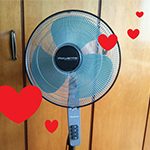Bicultural Urbanite Brianna
Fanning fears: Do draughts make us sick?

The 2018 European heatwave was a shock to the system for Berlin. The city is simply not built for hot weather. While there are plenty of nearby lakes where you can cool off, virtually no-one has air conditioning at home. For many Germans, even the humble fan is not a viable source of relief when summer is in full swing. Why? Due to a widespread belief that draughts can make you sick and must be avoided at all costs.
By Brianna Summers
Last summer the temperature inside our flat reached 30 degrees. So when things started heating up again this June, my husband and I armed ourselves with our trusty standing fan and bunkered down in anticipation of another protracted period of extreme heat. Like a loyal lap dog, our fan follows us around the flat, from the kitchen, through the living room, to the bedroom and back again.
 There’s a lot of love for fans at our place.
| © Brianna Summers
THE DREADED DRAUGHT
There’s a lot of love for fans at our place.
| © Brianna Summers
THE DREADED DRAUGHT
Growing up in Australia, my cultural milieu taught me that fans and air conditioning are Good Things that make life more comfortable during the summer months. Air conditioning pumping cool air inside a car? Love it. Sitting with wet hair in front a fan? Fabulous. However in Germany, I’ve discovered that some people fear draughts, believing that they can make your neck stiff and trigger flu-like symptoms. Not all Germans subscribe to this idea; it seems to be passed down within families like home remedies and heirlooms.
My German friend Christian grew up with the notion of the dreaded draught. While living abroad, he learned to appreciate the joys of air conditioning, yet his parents remain vigilant in their battle against indoor airflow: “My father insists on wearing a light scarf when driving his car, which is small and not a cabriolet. His argument is that he would otherwise get a sore throat from the draught when driving with a slightly open window. For the same reason, both of my parents like to cover their heads in summer when they expect a situation to be draughty, like in a car, also with an AC, or on a train.”
SURPRISE BIKRAM
My yoga instructor shares this Zugluft phobia. The other week she inadvertently turned our early morning class into a boiling hot bikram session in an attempt to shield us from the unspeakable effects of airflow. After a string of blisteringly hot summer days, a blissful cool change swept through Berlin and I decided it was safe to venture back to the yoga studio. When I arrived at 7:30am, I was surprised to find the windows merely tilted open and much of the week’s feral heat still trapped inside. After numerous hot and sleepless nights, it looked like I would have to endure yet another hour of stifling heat. “Well,” I thought, “at least there is some fresh air coming in.”
 My flat reached over 30°C during last year’s heatwave.
| © Brianna Summers
Inexplicably, just before the class started, our instructor closed all the windows. After about 10 minutes of stretching, sweating and fantasising about the crisp morning air just beyond the windows, I snapped, and asked if we could open the windows. Reluctantly, she complied: “Yes, ok…but just a little bit, otherwise there’ll be a draught.” I hope she didn’t catch my incredulous look as I mentally face-palmed.
My flat reached over 30°C during last year’s heatwave.
| © Brianna Summers
Inexplicably, just before the class started, our instructor closed all the windows. After about 10 minutes of stretching, sweating and fantasising about the crisp morning air just beyond the windows, I snapped, and asked if we could open the windows. Reluctantly, she complied: “Yes, ok…but just a little bit, otherwise there’ll be a draught.” I hope she didn’t catch my incredulous look as I mentally face-palmed.
How we choose to cool off appears to vary according to our cultural upbringing and individual preferences. One person’s deliciously cool breeze is another’s potential pathogen. Even the German Red Cross have pointed out that an aversion to draughts is a cultural idiosyncrasy. This summer, their tweet with tips for beating the heat went viral: “Open all your windows and turn on your fans! Draughts are not harmful, only the Germans believe that.” Who knew cooling was such a hot topic?